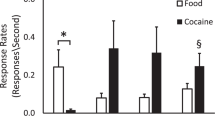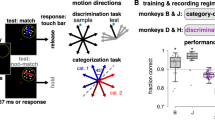Abstract
MONKEYS with lesions in the medial portions of the anterior temporal lobes (the amygdala and pyriform cortex) tend to show marked changes in their responses to events that, pre-operatively, served as rewards or punishments. For example, it has been claimed that animals tend to be unafraid of snakes and strange people, to mount inanimate objects, to ingest a host of objects that were unacceptable pre-operatively. According to one descriptive generalization1 monkeys are still motivated by reward and punishment, but the classes of events that are rewarding or punishing alter. In order to examine this view more specifically and also to rule out the possibility that the changes in reward–punishment classification occur simply because of changes in sensory capacity, the following experiments were undertaken.
This is a preview of subscription content, access via your institution
Access options
Subscribe to this journal
Receive 51 print issues and online access
$199.00 per year
only $3.90 per issue
Buy this article
- Purchase on Springer Link
- Instant access to full article PDF
Prices may be subject to local taxes which are calculated during checkout
Similar content being viewed by others
References
Weiskrantz, L., J. Comp. Physiol. Psychol., 49, 381 (1956).
Weiskrantz, L., and Wilson, jun., Wm. A., J. Comp. Physiol. Psychol., 51, 167 (1958).
Author information
Authors and Affiliations
Rights and permissions
About this article
Cite this article
WEISKRANTZ, L. Effects of Medial Temporal Lesions on Taste Preference in the Monkey. Nature 187, 879–880 (1960). https://doi.org/10.1038/187879b0
Issue Date:
DOI: https://doi.org/10.1038/187879b0
Comments
By submitting a comment you agree to abide by our Terms and Community Guidelines. If you find something abusive or that does not comply with our terms or guidelines please flag it as inappropriate.



